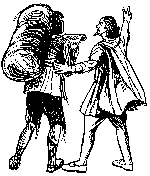 This Page Title – Gleanings in the Psalms (Psalm 15)
This Page Title – Gleanings in the Psalms (Psalm 15)The Wicket Gate Magazine "A Continuing Witness".
Internet Edition number 50 – placed on line September 2004
Magazine web address – www.wicketgate.co.uk
Verse 1. "Lord, who shall abide in Thy tabernacle? Who shall dwell in Thy holy hill?" A sense of the glory of the Lord and of the holiness which becomes His house, His service, and His attendants, excites the humble mind to ask the solemn question before us. Where angels bow with veiled faces, how shall man be able to worship at all? The unthinking may imagine it to be a very easy matter to approach the Most High, and when professedly engaged in His worship they have no questionings of heart as to their fitness for it; but truly humbled souls often shrink under a sense of utter unworthiness, and would not dare to approach the throne of the God of holiness if it were not for Him, our Lord, our Advocate, who can abide in the heavenly temple, because His Righteousness abideth for ever.
Verse 2. "He that walketh uprightly …" There is no ascertaining the quality of a tree but by its fruits. When the wheels of a clock move within, the hands on the dial will move without. When the heart of a man is sound in conversion, then the life will be fair in profession.
Verse 2. "He that walketh uprightly, and worketh righteousness …" But here observe, David saith, "that worketh righteousness;" not that talks about, thinks about, or hears of righteousness; because "not the hearers of the law, but the doers of the law shall be justified".
Verse 2. "… and worketh righteousness…" A righteous man may make a righteous work, but no work of UNrighteous man can make him righteous. Now, we become righteous only by faith, through the righteousness of Christ being imputed to us; "Therefore, being justified by faith, we have peace with God through our Lord Jesus Christ" ? Romans 5 verse 1. Therefore, let men work as they will, if they be not true believers in Christ, they are not workers of righteousness; and consequently, will not be dwellers in heaven. Ye must then close with Christ in the first place and receive the gift of imputed righteousness.
Verse 2. "He that walketh uprightly, and worketh righteousness, and speaketh the truth in his heart". I would resolve to do nothing that would need a lie. If Gehazi's covetousness had not shamed him, he had not wanted a lie to excuse him.
Verse 3. "He that backbiteth not with his tongue, nor doeth evil to his neighbour…" This plague is not only among the Egyptians but Israelites too. It is very doleful to consider how Christians sharpen their tongues like swords against Christians; and one good man censures and reproaches another, and one minister traduceth another; and who can say "I am clean from this sin?" Pity your brethren; let is suffice that godly ministers and Christians are loaded with reproaches by wicked men ? there is no need that you should combine with them in this diabolical work. You should support and strengthen their hands against the reproaches of the UNgodly world, and not add affliction to the afflicted.
Verse 3. "He that backbiteth not with his tongue…" In Leviticus 19 and verse 16 a talebearer is compared to a "pedlar". "Thou shalt not walk about with tales and slanders, as it were a pedlar among thy people". As the pedlar having bought his wares from some one or more, goeth about from house to house that he may sell the same to others, so backbiters and talebearers, gathering together tales and rumours as it were wares, go from one to another, that such wares as either themselves have invented, or have gathered by report, they may utter in the absence of their neighbour to his disgrace.
Verse 4. "In whose eyes a vile person is contemned…" When wicked Jehoram, king of Israel, came to Eliseus, the prophet, to ask counsel of the Lord and to entreat for waters, having in company Jehoshaphat, the king of Judah, being virtuous; the prophet showeth his contempt to the one, being wicked, and his reverence to the other, being godly: ? "As the Lord of hosts liveth, before whom I stand, were it not that I regard the presence of Jehoshaphat, the king of Judah, I would not look toward thee nor see thee". 2nd Kings 3 verse 14.
Verse 4. "… but he honoureth them that fear the Lord…" Calvin's resolution concerning Luther was very admirable in this respect. They differed much about the presence of Christ in the Sacrament; and Luther, being of a vehement spirit, wrote bitterly against those that held differently than himself did in that point. But Calvin often used to say that, although Luther should call him devil, yet he would do him that honour, to acknowledge him a choice servant of God.
 This Page Title – Gleanings in the Psalms (Psalm 15)
This Page Title – Gleanings in the Psalms (Psalm 15)The Wicket Gate Magazine "A Continuing Witness". Internet Edition number 50 – placed on line September 2004 Magazine web address – www.wicketgate.co.uk |